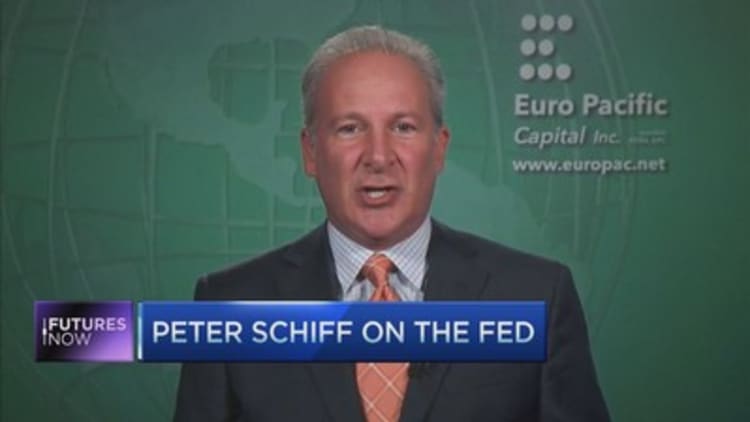


"Buy the dip" may not be the best stock market strategy just now, some analysts say.
Shares were rocked Tuesday as commodities fell on a new bout of global growth fears and forecasts of softer demand from China. While the market closed off its lows, analysts expect the choppiness to continue and the S&P 500 to retest its August low of 1,867.
"Even after the selloff, the market is expensive," said Jack Ablin, CIO of BMO Private Bank. "The low from August wasn't low enough to complete a correction. The financial crisis-level Fed policies are pushing financial assets to decouple from fundamental value."
The S&P 500 fell 1.2 percent to 1,942 on Tuesday, while the Dow lost 1.1 percent to 16,330. Stocks have seen their deepest correction in four years, breaking a pattern of shallow selloffs that were met by buying.
Read MoreChina has a message markets don't understand
But this time there is a higher level of uncertainty given fears about the potential of a slower China hitting the global economy, and the fact that the Fed expects to begin to reverse its near-zero rate policy.
"Investors who latched onto 'buy the dips' may be getting hurt in here," said Ablin. "They're getting bruised so maybe it's not a good time for that strategy."
Read MoreGlobal slowdown fear accelerates; How to trade it
The S&P 500 closed just above a support level—1,937 to 1,941—after trading below it much of the day. So far, there are slightly more than 200 S&P 500 companies with declines of 20 percent or more. Materials was the worst sector, down 1.8 percent.
"I think you're seeing some change in sentiment," said Art Cashin, director of floor operations at the NYSE for UBS. "I think the dip buyers are very nervous. I don't think they're quite extinct."
Cashin said the market was worried by deflationary pressures from falling commodities prices and the fallout on emerging markets economies. He noted that oil was dropping with other commodities, a negative for the market. "There was also concern that the Volkswagen thing might turn into a criminal fraud suit."
Volkswagen shares were down another 20 percent Tuesday in a second day of selling after it was revealed that some cars were rigged to get around U.S. emissions law.
"I still think most people believe if the market does test its low, it's a buying opportunity," said James Paulsen, chief investment strategist at Wells Capital. "I still think it feels calm." He expects the market selloff to end when the S&P hits 1,800 and investors begin to panic.
Read MoreLook out below—where stocks could bottom: Paulsen
"I do think there's been just a huge recommendation about buy on the dips," said Paulsen. "There are less now, but there's not a lot of sell calls."
Markets are looking ahead to Fed Chair Janet Yellen's comments Thursday afternoon, after the central bank held back on raising rates last week because of its concerns about China's slowdown.
"One or two days more of this, and Janet Yellen on Thursday will take a victory lap," said Cashin.
Read MoreThe Fed just made a gigantic mess
There is manufacturing PMI, released at 9:45 a.m. ET on Wednesday, and there is also manufacturing PMI form China overnight and from the euro zone. In Europe, European Central Bank President Mario Draghi speaks at 9 a.m. ET.
Traders were monitoring Chinese President Xi Jinping's U.S. visit, which included a speech Tuesday evening and a meeting with business leaders.


